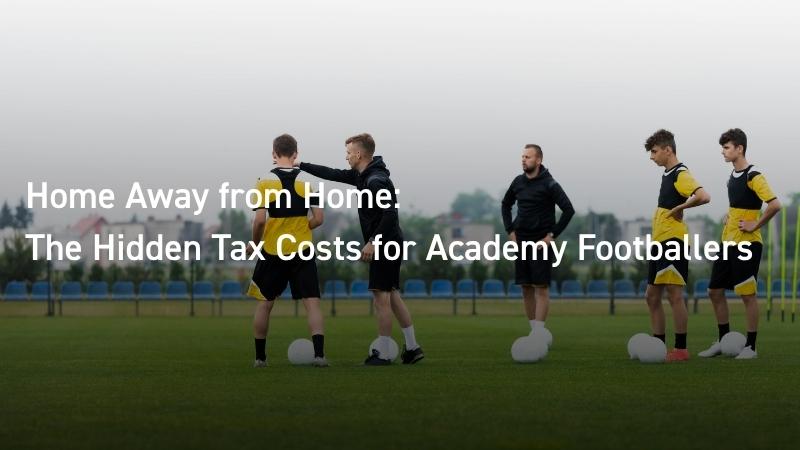
Young academy players are often seen as the future stars and given the Financial Fair Play Rules (FFP) clubs are now investing heavily into their football academies.
However, behind the scenes, these young ‘Scholars’ (16 to 18 year olds) face an often-overlooked challenge: tax liability resulting from their employer provided accommodation. When clubs provide housing, the value of this benefit can have significant tax implications. This article delves into the nuanced tax rules that can impact Scholars.
Safeguards in place
It’s easy to forget that footballers are still young adults and as such, necessary safeguarding is in place.
The Elite Player Performance Plan (EPPP), effective since 2012, provides a framework for the Premier League Youth Development Rules. Under these Youth Development Rules, academies must provide safe and suitable accommodation for any players under 18 who don’t live with their parents. The housing must meet certain legal standards and be located within close proximity to both the club’s training and educational facilities. Scholars also give consent to regular visits to their accommodation from appropriate club employees to ensure standards of care, and their welfare and wellbeing.
These safeguards ensure that young players, many of whom are still in full-time accommodation, are well looked after both on and off the pitch.
Club provided accommodation
As people under 18 cannot buy a house and living in rented accommodation alone can present welfare issues, players living away from home typically have two main accommodation options:
1. Club-Provided Housing: Usually dormitory-style accommodation or apartments located close to training facilities often used by Premier League clubs.
2. Host Families (‘Digs’): Many Premier League academies, place their scholars with host families, in their local area.
The value of the taxable accommodation benefit is calculated by the club and returned on the player’s P11D form at the end of the year. We have also seen arrangements whereby the accommodation benefit is classed as a taxable benefit and taxed at source via payroll (thus bypassing the P11D form and often overlooked). Either way, the taxable value of the accommodation is subject to tax in the first instance, unless a suitable tax relief claim can be made.
Tax legislation
Tax legislation provides relief, or rather an exemption from tax, if two conditions are both met; the living accommodation is required for better performance of the duties of the employment, and it is customary for employers to provide living accommodation for employees. These two facets are crucial when considering the tax liability for 16 to 18-year-old Scholars.
More can be found within Section 99(2) of the Income Tax (Earnings and Pensions) Act 2003 (ITEPA 2003) and HMRC have provided guidance on how they interpret the law.
The Better Performance condition
Under HMRC guidance, an employee must demonstrate that by occupying employer provided accommodation, they can perform their duties better than if they lived elsewhere.
There has been tax case law in which a police officer successfully maintained a tax relief claim for employer provided accommodation on the grounds that the accommodation was provided under express terms of service of the employment contract, and the existence of such as clause was for the employer to make the officer available at ‘maximum ease’.
A clear parallel could be drawn to footballers; player contracts include explicit proximity clauses to training facilities, meaning living too far away could result in a breach of contract. Crucially, Scholars are often called in at short notice, making proximity to the club’s facilities essential.
Further comments on this condition are given in the ‘Applying Common Sense’ section below.
The Customary condition
HMRC’s guidance (based in part on tax case law) states that the ‘customary’ condition is satisfied where it is ‘normal’ practice to provide living accommodation within the industry and not just for the specific employer.
While quantifying ‘normal’ practice can be difficult in general, the aforementioned Youth Development Rules clearly mandate accommodation provision for football academies, strengthening the case for Scholars.
Tax case law suggests custom is not established where less than half of the industry’s employees in a class of employees receive accommodation. Again, potentially difficult to quantify for other industries, but simpler in professional football given the way academies are required to operate.
Given the accommodation requirements have been in place for over ten years, this long-standing practice is likely sufficient to establish ‘custom’.
Applying common sense
Consider an under-18 player originally from Birmingham joining a top London club football academy. The round-trip from their parent’s home is around 4 hours, and their contract also states (as is typical and understandable) that the player must reside within 15-20 miles of the training ground.
If this player commuted 4-5 times weekly from their home to the academy, their performance as a footballer would unquestionably be adversely affected to a material degree, as would their education.
Clubs customarily offer local accommodation to address these concerns and to ensure compliance under the Youth Development Rules.
The fact that there may be some local players does not prevent the club offering accommodation to both locals and to those who come from further afield.
Professional tax guidance: an early career asset
While becoming a football academy Scholar is part of the journey to becoming a fully-fledged professional footballer, many players do not make it past academy level.
A tax charge on employer required accommodation can present a significant financial hurdle. While the earning potential of professional footballers is high, current academy players may earn less than is perceived and are often, given their age, still learning cash management.
As young academy footballers navigate the challenges of football and indeed life, the somewhat hidden tax implications of their accommodation and the ways to mitigate such a charge serve as a vital reminder. Tax advisors can be an asset, even at an early stage in their career to help minimise tax charges and ensure good cash flow.
We’d love to hear from you. To book an appointment or to find out more about our services: